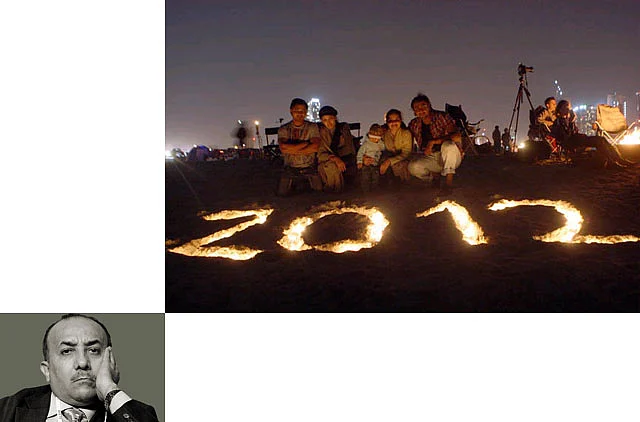The past year was an epic one of revolutionary and unpredictable changes, people power and realignments. As 2011 gave way to 2012, all the unfinished revolutions, incomplete projects and half-accomplished dreams and inspirations, leave a question: where will these changes lead us in 2012? The natural conclusion is that there is a lot of uncertainty.
Everyone — political scientists, leaders and ordinary people — is asking what will be the state of the world in 2012. Elections are due in three of the permanent members of the UN Security Council — the US, Russia and France. Then there is the expected change in the Communist leadership in China, which will face social and economic challenges in the future. The UK is also having to confront a challenge to its Union, with Scotland entertaining hopes of secession
As 2011 ended, four major issues remained unresolved. The fate and the future of the Arab Spring and where it will take the region, its people and political system in 2012. How will the Arab awakening fare in 2012? Will there be a consolidation of peoples' power and nation-building in countries which experienced revolutionary changes? The countries to keep an eye on are those that are still witnessing upheavals, especially Syria, where events could lead to a sectarian civil war and militarisation of the uprising.
The international community, led by the Security Council, may then play a more robust role, wherein a Libyan-style intervention could not be ruled out. Then there is the unfinished business of revolutionary change in Yemen. The real challenge for these Arab countries is how to consolidate the changes and channel them into nation-building, and strengthening the representative institutions and delivering on the promises of elections, accountability and rule of law.
European debt crisis
The second issue to keep an eye on is the fate of the sluggish world economy and how it will fare in 2012. Christine Lagarde, the head of the International Monetary Fund, gave a sobering assessment, describing the state of the world economy in 2012 as "quite gloomy", warning of a second ‘Great Depression', especially if Europe failed to resolve its sovereign debt crisis. This will certainly influence the fate of the EU and Eurozone along with the euro.
How to deal with these challenges, even as there is a looming showdown between Europe's heavyweights, led by Germany and France and an opposing and determined UK? Europe faces a real test and its identity and future hang in the balance as Greece and other beleaguered economies struggle to gain traction and confidence. No doubt, 2012 will be a crucial year for the future of the EU.
The third major issue to watch in 2012 is the US presidential elections and whether President Barack Obama will be re-elected in November. Obama's chances depend on the fate of the US economy; and the confidence of the American consumers as unemployment inches down. The good news is that there are hints of a start of recovery, with a lower unemployment rate for the first time in years. What cushions Obama is his delivery on his campaign promise in 2008 to pull out US troops from Iraq and starting the drawdown of troops from Afghanistan in 2012. Of course, the killing of Osama Bin Laden resonated with voters, security threats receded but domestic issues related to employment, taxes and recession now preoccupy American voters. The quality of the Republican challengers is another factor in favour of Obama.
The fourth issue is: Will Iran reach the point of no return in its drive to become a nuclear powerhouse in the Middle East? Will this trigger a nuclear arms race, with an emboldened Iran testing the resolve of the US which is retreating from Afghanistan and Iraq? These recalibrations, as one US journal recently opined, are making "Arab states friendly to the US perceive US influence in the Middle East [as] waning and [they] have begun looking for other partners to help ensure their security. China is the obvious candidate and is showing that it is prepared to fill any power vacuum the US chooses to leave."
This could be spinning things beyond the realm of reality but it may be a sign of things to come. In the final analysis, the uncertainty about 2012 was highlighted by the Real Clear World publication, which concluded that there are several key questions: Will the "Arab Spring yield a new and generally more stable and peaceful Middle East or something worse? Will the US and Nato find a satisfactory exit from Afghanistan? Will Iran's nuclear programme trigger an arms race, or worse? Will China avoid a political and economic crisis? How about Europe? And how about the "ever present possibilities of the unknown unknowns? That could come to dominate the global discussions." What the publication concluded could be prophetic: "The course ahead looks rocky and uncertain."
Professor Abdullah Al Shayji is the Chairman of the Political Science Department, Kuwait University. You can follow him on Twitter at www.twitter.com/docshayji
Sign up for the Daily Briefing
Get the latest news and updates straight to your inbox
Network Links
GN StoreDownload our app
© Al Nisr Publishing LLC 2026. All rights reserved.
